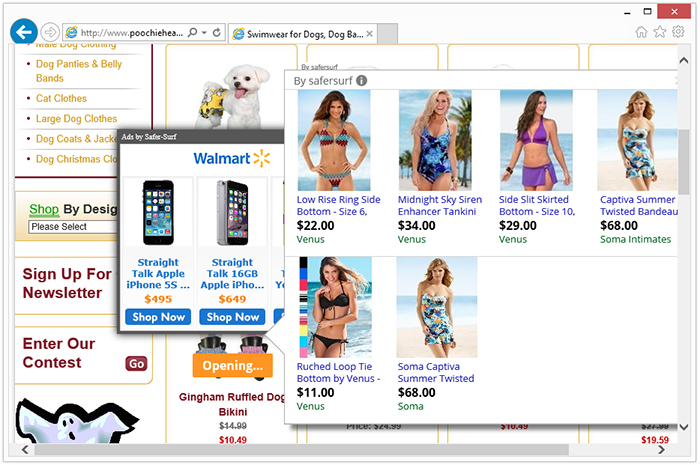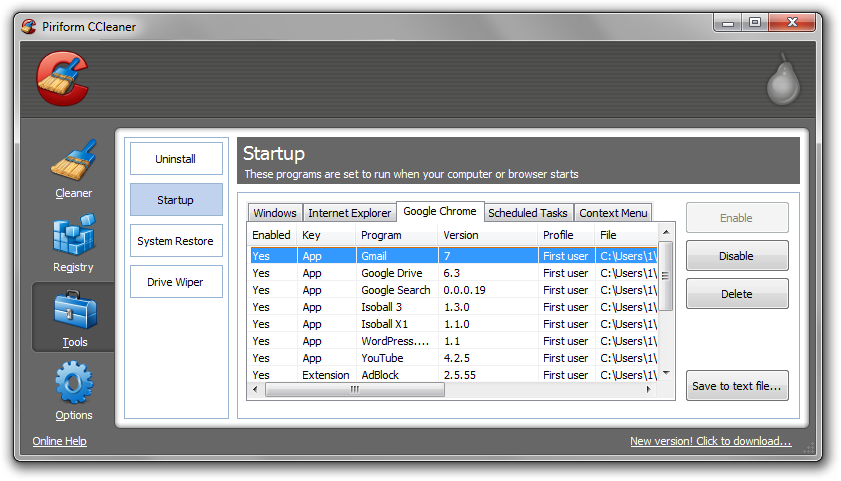Ads by SASA virus
Ads by SASA are caused by potentially unwanted programs (PUPS) found in the adware category of computer threats that infiltrate a computer system and attach to affected internet browsers as add-on and extensions without user knowledge. Unwanted applications used to promote SASA ads have permissions set allowing them to observe, gather, and modify user browser data, browser settings, and system settings in order to target users with specific advertisements and cause other unwanted activities.

Ads by SASA appear across multiple platforms and internet browsers; SASA adware may also share collected user browsing data (such as browser activities, bookmarks, and history) with unspecified third-parties. This will additionally result in email spam, junk mail at home, phone calls from telemarketers, and other unwanted activities.
Potential SASA malware is frequently referred to as the “SASA virus” even though this program is not technically defined as a computer virus. This is because SASA adware is known to be very destructive. It can create and modify existing browser and system settings (including system start-up settings) and it primarily bundles with other unwanted programs, malware, and malicious threats that can cause further issues.
How to remove SASA
This SASA removal guide will help you completely remove the SASA virus, unwanted programs, and malware in order to get rid of ads by SASA on Google Chrome, Mozilla Firefox, and Microsoft Internet Explorer.
- Step 1: Scan your computer for malware
- Step 2: Cleanup and repair settings
- Step 3: Uninstall SASA
- Step 4: Remove SASA browser attachments
- Step 5: For Tech Support Call: 1-888-879-0084
Step 1: Scan your computer for malware
1. We recommend that you write down the toll free number below in case you run into any issues or problems while removing SASA. Our techs will kindly assist you with any problems.
if you need help give us a call
2. Install the free or full version of Malwarebytes Anti-Malware. The full version enables real-time protection to block malware and unwanted programs from infecting your computer, while the free version is just a free scan and removal tool.
3. Once Malwarebytes is installed, run the Anti-Malware program. Malwarebytes may automatically begin to update and scan your computer at this point.

4. Once Malwarebytes has been opened, if a scan or update has not automatically initiated, please click the large Scan Now button or visit the “Scan” tab to manually run a scan. Before the scan is started Malwarebytes may ask to update the software, make sure to do so if prompted to.
5. Once the scan is complete, click the Quarantine All button to isolate and remove the detected files. You may be asked to reboot your computer after removal to completely remove detected files.

6. You can also chose to visit the History tab and click Delete All to remove these files from the Quarantine log, although these files no longer provide a threat.
Step 2: Cleanup and repair settings
1. Install the free or full version of CCleaner by Piriform.

2. Once installed, open the program and navigate to Cleaner > Windows/Applications and click the Analyze button. Afterwards, click the Run Cleaner button on the bottom right of the program interface.

3. Next, navigate to Tools > Startup and search through each tab starting from windows, internet explorer, etc., all the way to Content Menu, for additional suspicious entries and click Disable and Delete once anything is found.
4. To automatically uninstall SASA using CCleaner, navigate to the Uninstall tab and search for the program in the list of installed programs. Uninstall the unwanted software as selected by clicking the Run Uninstaller button.
Step 3: Uninstall SASA
1. Access Windows Start Menu and navigate to the Control Panel (on Windows 8, right click the bottom left corner to gain access to the Windows 8 Start Menu. Windows 8 may also select Programs and Features).
2. In Windows Control Panel, click Uninstall a program or Add and remove a program in the Programs section (If you are using Windows 8 you will bypass the Control Panel).
3. In the list of installed programs, search for SASA. Once the program is located, double click the unwanted program or select it with your mouse and click the Uninstall button. *Follow any on-screen instructions that may prompt to remove this program. Repeat the steps to remove additional unwanted programs.
4. Restart your computer.
Step 4: Remove SASA browser attachments
Google Chrome
1. Click on the Customize icon (3 bar icon) next to the address bar and navigate to More tools > Extensions.
2. Search for the SASA extension and other suspicious extensions and remove them individually by clicking the trashcan icon next to it.
Mozilla Firefox
1. Type Ctrl+Shift+A.
2. On the Extensions and Plugin search for the SASA add-on and other suspicious add-ons and remove them if located.
Microsoft Internet Explorer
1. Click Tools and select Manage add-ons.
2. On the Toolbars and Extensions tab search for the SASA add-on, click it, and click the Remove button. Remove other suspicious add-ons if found. If the Remove button does not appear you must first uninstall associated software through the Control Panel.




Leave a Comment